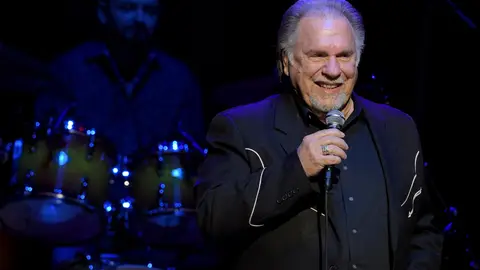At 76, Gene Watson Becomes Newest Member of the Grand Ole Opry

The Grand Ole Opry's glacial delay in picking Gene Watson as a member was surely one of the greatest cultural oversights of our time. But it will be remedied on Friday (Feb. 7) when the caramel-voiced singer officially joins the cast of the legendary stage show and radio broadcast.
Critics have long considered Watson one of country music's supreme vocal stylists, rivaling the dramatic story-telling and mood-setting power of such singulars as George Jones, Vern Gosdin, Earl Thomas Conley and Willie Nelson.
Now 76, Watson first played the Opry 55 years ago when he was just gaining national attention via his sultry 1975 single, “Love in the Hot Afternoon.” In an earlier interview with CMT.com, Watson recalled taking a gamble on the song. “It had already been recorded by several artists, one of them being Jim Ed Brown, if I'm not mistaken. (It was in Brown's 1972 album, Evening.) But they had kind of smoothed down the lyrics in it because it was pretty spicy for those days.
“Then I got hold of the song: the original demo. We were flying to Nashville, and I told my manager-producer, 'You know, I want to cut this song, but I want to cut it the way it was written.' I said, 'Let's just go for it, and if it gets played, OK, and if it don't, we haven't lost that much.' So I went in there and backed my ears, and we came up with the unique fiddle turnaround in it and, of course, Commercial Hurshel (Wiginton, a background singer) on that bass line in there -- 'file gumbo.' It just turned out to be a good record.”
It was a very good record, indeed, one that laid the foundation for such soon-to-be classics as “You Could Know As Much About a Stranger,” “Paper Rosie,” “One-Sided Conversation,” “Nothing Sure Look Good on You,” “Should I Go Home or Should I Go Crazy,” “Fourteen Carat Mind,” “Memories to Burn” and the inconsolably mournful “Farewell Party.”
Because Watson was so intent on recording only songs whose emotions he could identify with, they tended to inscribe themselves in the listener's mind, even when they didn't go No. 1 or Top 5.
As a chart artist, Watson peaked in the mid-1980s, but as a crowd-pleaser, his allure has never dimmed. In his recordings of such pop standards as “At Last” and “What a Difference a Day Made,” he showed that his vocals were as suited to supper clubs as honky tonks.
In 2011, he teamed up with bluegrass queen Rhonda Vincent for the album, Your Money and My Good Looks. The two continue to play occasional shows together. His My Heroes Have Always Been Country from 2014 featured covers of such immortals as “Long Black Veil,” “Slide Off Your Satin Sheets,” “It's Not Love (But It's Not Bad)” and “Make the World Go Away.”
Never one to leave a musical base uncovered, in 2017, Watson treated his fans with the collection My Gospel Roots. And he has not slowed down. His website lists more than 50 shows scheduled for the coming year.
When he surprised Watson on the Grand Ole Opry stage back in January to tell him he'd been invited to become a member, Vince Gill told the crowd, “He's one of the greatest country singers that's walked the earth.” There's no argument there.





